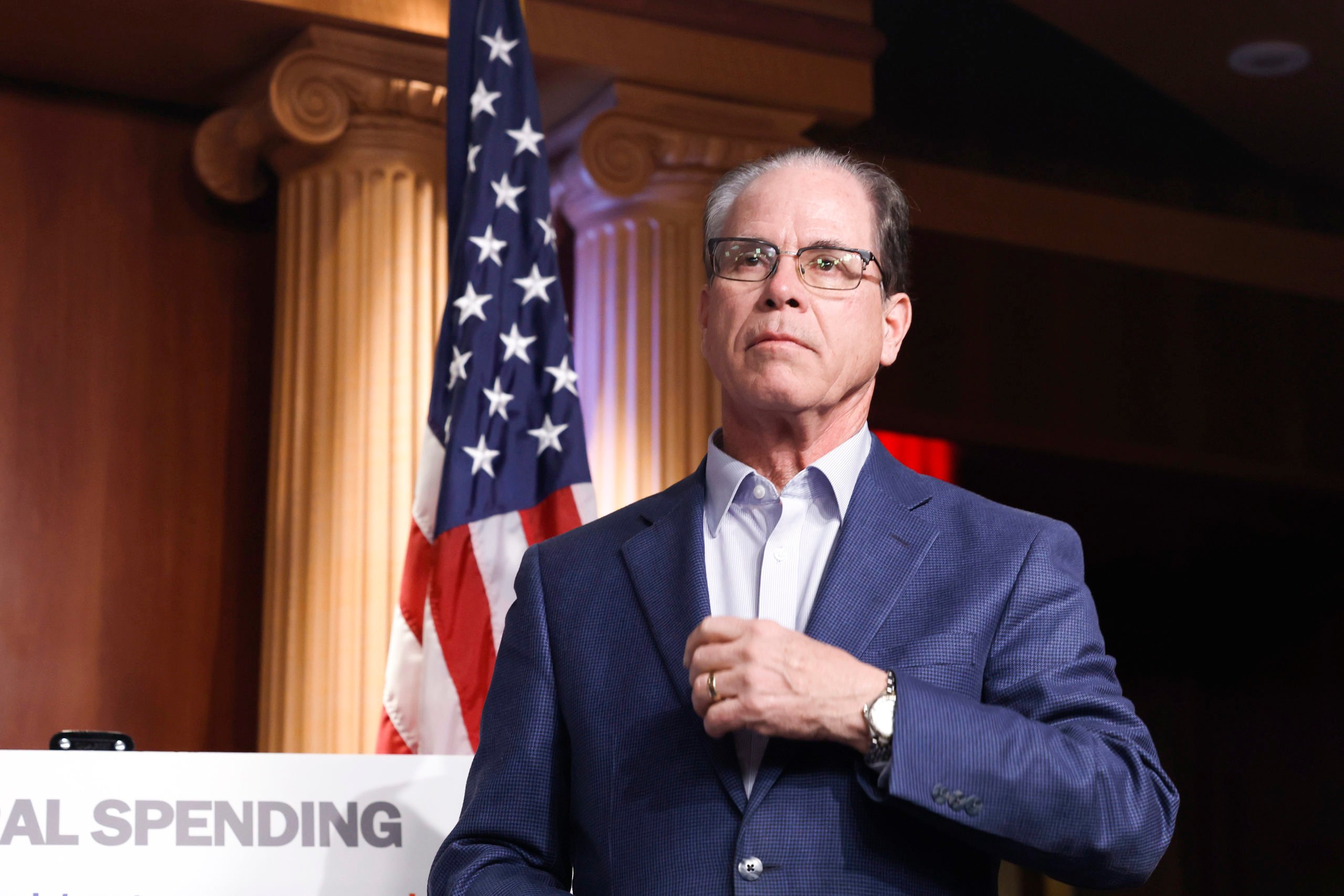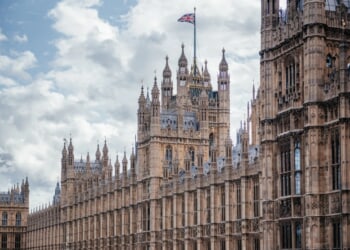As tuition costs soar to astronomical heights across the U.S., one Republican-led state is leading the charge in the battle to rein in greedy universities.
Indiana Gov. Mike Braun has moved to tackle the problem head-on, announcing on June 24 that all 15 of Indiana’s public colleges and universities have committed to keeping tuition rates flat for the upcoming academic years following the governor’s request. Many politicians have become complacent in following the lead of schools rather than challenging them to find ways to stay affordable for students and families, Braun told the Daily Caller News Foundation. (RELATED: House GOP Turns Up Heat On Universities Suspected Of Gouging Students With Tuition Rates)
“You had to be a little entrepreneurial, and you had to just push the envelope,” Braun said of his efforts. “When you have governors and state governments that just abided and act like there’s nothing you can do, that’s going to give the latitude for schools to think that there’s a never-ending spigot, which is finally starting to tap itself out.”
The universities’ agreement to maintain their current rate for tuition and mandatory fees throughout the 2025-2026 and 2026-2027 academic years was sparked by Braun’s petition to the state’s higher education commission to recommend a 0% price increase to institutions.
Some of the most high-profile and wealthiest institutions in the nation have in recent months announced skyrocketing price hikes for students. Universities such as Cornell, Duke and the University of Michigan (UM) all increased tuition by over 4%. At the University of Minnesota (UMN), some students can expect an increase of 7.5% in the next school year.
“There’s no incentive within healthcare or education, because it’s not market driven,” Braun said. “Whenever you’ve got easy revenue sources, it creates the atmosphere to not watch costs and expenses, and then parents and kids have been brainwashed to think the only way you could be successful in life is to get a four-year degree. That’s all kind of run its course in many businesses.”
Many businesses have grown wise to the depreciating value of college degrees, Braun told the DCNF, especially as universities have become hotbeds for leftist programming. As a result, several companies are no longer requiring employees to hold post-secondary degrees. (RELATED: Universities Sit On Billion-Dollar Endowments While Jacking Up Tuition)
“Many places are just saying, ‘Hey, you’re not giving us the degrees we need. They’re costing too much,’” Braun continued. “That’s where parents and kids are starting to take a second look. And now even businesses are saying, let’s look at other ways of doing it. And I’m just going to try to lead here in Indiana on how it can be done.”

Sen. Mike Braun (R-IN) listens during a news conference at the U.S. Capitol Building on January 25, 2023 in Washington, DC. (Photo by Anna Moneymaker/Getty Images)
While many universities complain about the Trump administration’s funding cuts or general rising costs as the reason for raising prices on students, the real culprit is often schools’ bloated administrations and reliance on funding from the government. Furthermore, university tuition costs have been rising for decades, predating the Trump administration and far outpacing inflation.
While the student population at universities increased by 92% from 1950 to 2013, administrative positions have increased by 702%, according to the American Enterprise Institute. At the same time, an increase in federal student loans has allowed universities to up their price tag, knowing that if students cannot afford it, the government will pay up while charging astronomical interest to families, according to Cato institute.
“They’re generally over staffed across all aspects of their business,” Braun said of universities, adding that federal COVID-19 funds largely contributed to schools expanding beyond what they could normally afford.
“That sugar high has run its course, but almost all of the institutions have gotten used to it,” Braun told the DCNF. “A lot of it has to do with the teaching establishment making the case that you’ve got to have a four year degree or something post secondary. That has now run into those two walls of they’re not giving us a quality product at a fair value and parents simply can’t afford going down that path, so as a result, they’re going to have to start looking at their operations and running it like a business would.”
Part of the reason Indiana has been successful on this front, according to Braun, is because one university in the state has been following this business model for years.
Purdue University, ranked in the top 20 public schools in the nation, has not raised its tuition on students since 2012.
“We basically had everyone come along without even fighting it because they knew Purdue set the bar to where it could be,” the governor said.
Some universities make up for lower in-state tuition costs by raising costs on out-of-state students and admitting more international students, who pay full tuition without financial assistance. Schools like Harvard, which makes up more than a quarter of its student body with foreign students while also providing free tuition for many others, largely depend on these foreigners.
Harvard has so far been successful in its attempt to prevent the Trump administration from banning foreign students from enrolling at the university after Harvard declined to increase vetting measures to protect against foreign adversaries and anti-American activity.
“That’s the establishment in education trying to make every excuse to not do what everyone else does, so they’re not going to get by with that,” Braun said. “I mean, if out-of-state students and international students are wanting to come here, there’d be a point where you’d punch them, probably out of the market. But we’re not there in Indiana by a long stretch.”
Universities pumping their student bodies full of foreign students may only be a temporary solution to a bigger problem, the governor told the DCNF.
“I think as long as the rest of the world views us as being worth paying that premium, you can run that kind of trajectory,” Braun stated. “But I think sooner or later, they’ll even be chasing away foreign students if they’re not running their businesses more efficiently, because that, to me, sounds like a temporary option, but they’re not getting at the root of the problem, which is they’ve gotten used to easy revenue streams and running sloppy operations. So I don’t think that’ll do much more than give them a reprieve, and hopefully they’ll start looking at the real ways they become more relevant over time.”
“Give us degrees that have a market, not ones that send you back into the basement or out of state looking for a job, and do some things that pay more attention to your customer, which is going to be parents and kids and long overdue to reorient,” Braun continued.
In 2025, a record number of U.S. college graduates remain unemployed, according to data from Oxford Economics. This is partially due to students choosing degrees with limited job market potential, such as gender and ethnic studies or even fine arts. With the increasingly unstable conditions at elite universities caused by anti-Israel protests, some employers are even scrutinizing future hires’ activities on campus.
Private institutions may soon find themselves pinned against a wall if they continue down this path as degrees become less relevant and students turn to alternative routes, Gov. Braun said. With the Trump administration shining a light on the many failures of seemingly elite schools, the intrigue may soon fade.
“I think the private side is even more fraught with uncertainty and disruption,” Braun told the DCNF. “I think they probably have more concern about how they’re going to be relevant into the future and in any business, sooner or later, if markets change and you’re not adapting to it, you’re going to be going out of business.”
The governor also added that some of the focus may turn to reforming and improving K-12 education.
“That’s going to even dry up some of the supply to colleges,” Braun stated. “But when you’re doing things that are disruptive and you’re going through change that always presents opportunities for the enterprises in that sector.”
All content created by the Daily Caller News Foundation, an independent and nonpartisan newswire service, is available without charge to any legitimate news publisher that can provide a large audience. All republished articles must include our logo, our reporter’s byline and their DCNF affiliation. For any questions about our guidelines or partnering with us, please contact licensing@dailycallernewsfoundation.org.










![Florida Man With Violent History Arrested for Choking a Cop [WATCH]](https://www.right2024.com/wp-content/uploads/2025/06/Eleven-Stabbed-in-Attack-at-Salem-Homeless-Shelter-Across-From-350x250.jpg)






